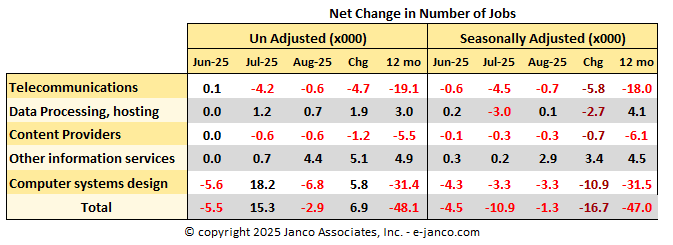Fears rise in IT circles over new economic downturn
Somber Analysis Modest Recovery in IT Pay
Posting from the ITBusinessEdge blog
Fears rise in IT circles over new economic downturn - While Gartner and IDC recently raised their projections for IT spending this year, a salary survey by Janco Associates finds penny-pinching still rules the day, though layoffs seem to have tapered off.
The data, which has been updated through June, found 55,500 IT jobs added in the United States since January.
In a story about worries that the economy could torpedo IT spending, Computerworld quotes Victor Janulaitis, Janco's CEO, saying:
Right now there is feeling amongst a number of organizations that we are going to go into a second dip of a recession, and that second dip could be deeper than the current dip.
A slightly more upbeat CompTIA report issued earlier today found midsize businesses most likely to add IT staff. And as a percentage, 1.44 percent, those staff salaries grew the most in the Janco Associates report, but they started lower. They rose from $61,047 to $61,924. The mean for all IT positions at midsize firms grew by 0.43 percent from $73,934 to $74,253. For large organizations, median pay rose from $81,493 to $82,273.
The total mean compensation for all IT pros in 73 job categories that range from CIO to data entry operator grew by just 0.35 percent to $77,873 from $77,604. This puts pay back at the January 2008 level, before the recession.
The job market for CIOs is basically non-existent at the moment, according to the report. It says that if companies were displeased with their CIOs, they've already replaced them, and that those still on the job find the current economy too iffy to make a move. It puts mean compensation for CIOs in large enterprises at $184,681 (up 1.73 percent) and $163,106 (an increase of 0.49 percent) in mid-sized enterprises. Meanwhile, middle managers — some of the most important folks around, according to this study — and non-line IT executives continue to feel a salary crunch.
The report also found companies continue to reduce the benefits offered to IT pros. Though they still offer health insurance, generally employees are footing more of the bill. But it found flexible hours and work schedules becoming more common.
It's no surprise that the use of contractors and part-timers is on the rise, especially those focused on particular critical projects. It lists these as the most in-demand skills:
- Project management – especially large projects with short time frame for delivery
- Security – focused on mandated compliance issues
- Network administration – wireless and cloud administration
- Virtualization (cloud) – new applications and management of IT infrastructure
- Business and operational analysis – focused on business change
- Productivity improvement analysis – metrics and operational analysis
- Web 2.0
- Database management
- System administration
- Desktop support
Net Change in Number of IT Jobs - Latest Data
Subscribe to our Newsletter to get this information delivered to your inbox as soon as it is released. SUBSCRIBE







